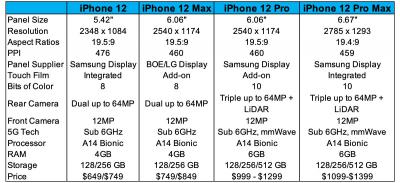OLED Smartphones - introduction and industry news - Page 24
DSCC details the iPhone 12 screens and OLED suppliers
DSCC posted an interesting blog post, in which they detail what they believe to be Apple's iPhone 12 smartphone family specifications.
So we start with the iPhone 12, which will use a 5.42" 2348x1048 (476 PPI) flexible AMOLED display, produced by Samsung Display. DSCC believes the iPhone 12 will use a Y-OCTA integrated touch. DSCC believes that while BOE did not manage to get its panel to the iPhone 12, it may become a supplier in 2021 to the iPhone 12s - if all goes well with the iPhone 12 Max (see below).
UBI lowers its 2020 OLED industry forecast due to the Coronavirus
UBI Research lowered its forecast for the OLED industry in 2020, due to the coronavirus pandemic. UBI decreased its total market revenue forecast by 4.8% to $36.7 billion.

UBI now estimates that 612 million OLED panels will ship in 2020, down from its previous estimate of 660 million. The OLED TV market forecast was reduced dramatically from 4.9 million panels to 3.6 million.
LG Display reports disappointing results for Q1 2020 as COVID-19 lowers demand for smartphones and TVs
LG Display reported its financial results for Q1 2020. LGD's revenues were 4.7 trillion Won ($3.8 billion USD), decreased 26% from the previous quarter and 20% from Q1 2019. The company's net loss in the quarter was 199 billion Won ($161 million USD).

LGD's revenues and earnings were below analysts expectations - the company's business was hit by the Covid-19 pandemic which caused lower demand for smartphones and TV panels (which were also hit due to the postponing of major sporting events). LCD panel prices have also taken a hit.
DSCC sees 5 million foldable OLEDs produced in 2020, over 77 million in 2025
DSCC says that the future will bring significant growth for foldable OLED displays - fueled by lower panel prices as production increases and yields improve, lower device prices and improved display reliability as devices improve.

DSCC sees meaningful improvements in devices starting in the second half of 2020. In 2020 around 5 million foldable devices (mostly smartphones) will ship, generating almost $1 billion in revenues. From 2020 to 2025, foldable display shipments will rise to 77 million units (a CAGR of 132%) and revenues will reach almost $8 billion (CAGR of 113%).
Omdia: Smartphone AMOLED shipments to rise in 2020 in a plunging smartphone market
Omdia (IHS Markit) says that even though global demand for smartphones in 2020 will drop 13% compared to 2019 due to the Coronavirus pandemic, the demand for smartphone AMOLED displays will increase by 9%. AMOLED penetration will rise sharply in 2020.

In 2020 513 million smartphone AMOLED panels will ship, up from 471 million in 2019. The growth will be entirely driven by flexible AMOLEDs which will see a 50% surge in production in 2020. Rigid OLED shipments will decline 12% in 2020.
Huawei says it lost $60 million on its Mate Xs foldable smartphone in two months
Huawei launches its Mate Xs foldable smartphone in February 2020, with a 8" 2200x2480 foldable AMOLED display (produced by BOE). Huawei's consumer business CEO, Yu Chengdong, says taht even though the Mate Xs costs $2,400 the company lost around $60-70 million on this smartphone since its launch.

The Mate Xs is an updated Mate X, with the same display and form factor, but with upgraded specifications.
Royole announces new foldable OLED displays with much improved specifications
Chinese OLED developer Royole announced its next-generation (3rd-Gen) fully flexible OLED displays, which it refers to as "Cicada Wing". Royole says that these new displays deliver significant improvements over its previous generation displays. The new displays have a material stack of over 100 layers.
Cicada Wing displays, compared to Royole's 2nd-Gen flexible OLEDs, offer 5X higher contrast, 50% higher brightness, 20% faster response time and a better color shift. It also offers a low brightness decay (Royole says it is 3.5X better then competing foldable OLEDs).
DSCC details its 2020 OLED market estimates
DSCC says that OLED area shipments will grow in 2020 to around 10.5 million square meters, up from 8 million square meters in 2019 - a growth of around 31%. In terms of revenues, the OLED market will grow 35% in 2020 to reach $37.6 billion. DSCC says that in 2020, 731 million OLEDs will be produced (up 27% from 2019).
Smartphone revenues will reach $30.7 billion in 2019 (up 35% from 2019) while TV revenues will grow 28% to $3.2 billion. Smartwatch revenues will increase 11% in 2020 to $2 billlion. The revenues for all other OLED applications are expected to increase by 69% in 2020 to $1.6 billion, mainly driven by laptop OLED displays.
DSCC: 577 million OLED panels shipped in 2019, generating $27.9 billion
DSCC says that OLED panel revenues in Q4 2019 reached $8.1 billion, down 2% from Q3 2019 and pretty much the same as in Q4 2018. In terms of units, DSCC says that in Q4 2019 124 million smartphone panels were shipped, 31 million wearable panels and 998,000 TV panels.
Smartphone revenues in Q4 2019 were down 2% from Q4 2018 (due to lower average sales price for both rigid and flexible panels, the number of panels actually increased 4%), and revenues for TVs were up 30% (to $752 million). Smartwatches remain the 3rd largest market for OLED panels, and experienced strong growth in 2019, but it seems as if the growth may have plateaued (in Q4 the revenues were down 7% from last year).
We now list BOE's 5.99" 1080x2160 flexible smartphone AMOLED display at the OLED marketplace
We are happy to announce that we now list a new panel at the OLED Marketplace - a BOE 5.99" 1080x2160 flexible AMOLED display with a flexible touch panel.
This is a high-end smartphone display (but can be used for other applications as well) that is now in production (at BOE's B7 line in Chengdu). Check out more information over at the OLED Marketplace, or contact us now.
Pagination
- Previous page
- Page 24
- Next page




